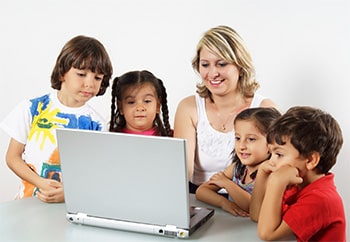Should children have access to technology and how much is too much?
Children today were born breathing in technology, from mobile phones and tablets, to TVs and computers. The world our children is growing up in is vastly different to previous generations. Everyone has an opinion on this subject, from child psychologists, medical professionals to parents and teachers. But what is the right decision for your child?
I have heard a lot of people say a child should not watch TV until they are at least 2 years of age. But how many children under 2 watch TV, or are in the same room as a switched on TV on a regular basis? Is this breaking that ‘rule’?
The majority of articles you read state a specific maximum amount of time a child should spend using technology each day, which is determined by their age.
I have heard some mums, and dads, say they feel like a bad parent because they needed to get a few things organised and the TV or iPad was the only thing that would keep their child occupied for more than 5 minutes. But is this ‘bad parenting?’
Let’s face it, technology is an important part of our every day life and will continue to be so. Technology is evolving so quickly, a lot of us find it difficult to keep up with it, including specialists ever-changing opinions as to whether children should have access to an iPad or computer.
A study conducted by the Kaiser Family Foundation found that school aged children spend an average of 7.5 hours per day in front of either a TV, computer, iPad or other digital device. That’s over 50 hours per week. The fact that most devices are mobile gives children access in places they never would of had it before, such as in the car, resulting in more hours of screen time.
So lets weigh up the pros and cons of children having access and using technology. The benefits include children having access to multiple early learning and development programs, such as apps identifying shapes and colours. In one study, research showed that adolescence’s who watched small amounts of educational TV during their preschool years, placed more value on their own achievement, read more books and had higher grades compared to those who watched entertainment TV. However, some experts express their worry by linking technology to obesity, difficulty in paying attention, interactivity and social issues, dulled imagination, lower academic performances and increase in aggressive behaviour. But their biggest argument is that screen time takes away the natural ‘hands-on creative play’ that is essential to a child’s development. On the other hand, other experts and parents don’t actually agree; they argue that computers and iPad apps can make learning fun and increases their engagement in exploring and problem-solving.
Technology itself does not create problems, what matters is how the technology is used. Parents can introduce programs and apps that are educational and beneficial while also monitoring their child’s screen time, ensuring they are not sacrificing time for homework, physical activities and social activities.
It is all about moderation.
So, the answer to the question whether children should use computers is up to you, there is no right or wrong answer. You just need to think about it and set boundaries when they are younger.
Such boundaries may include:
- No devices at the dinner table
- Allow a certain amount of time per day (20 – 30 mins for toddlers and preschoolers) and don’t go over, this creates healthy media habits
- Once their time is up, put the devices, such as the iPad, away (out of sight, out of mind!)
And also remember to always fully check a program before allowing your child access, just because an app or TV program says its educational does not necessarily mean it is!
You know your child and have their best interests at heart. Use common sense when making the decision as to what age they are introduced to technology and how much they use it, and if you set boundaries that don’t work or you don’t think ‘fit’, then you can always change them. What works in your family may not work or fit for another family. There isn’t really a ‘one size fits all’ option.






